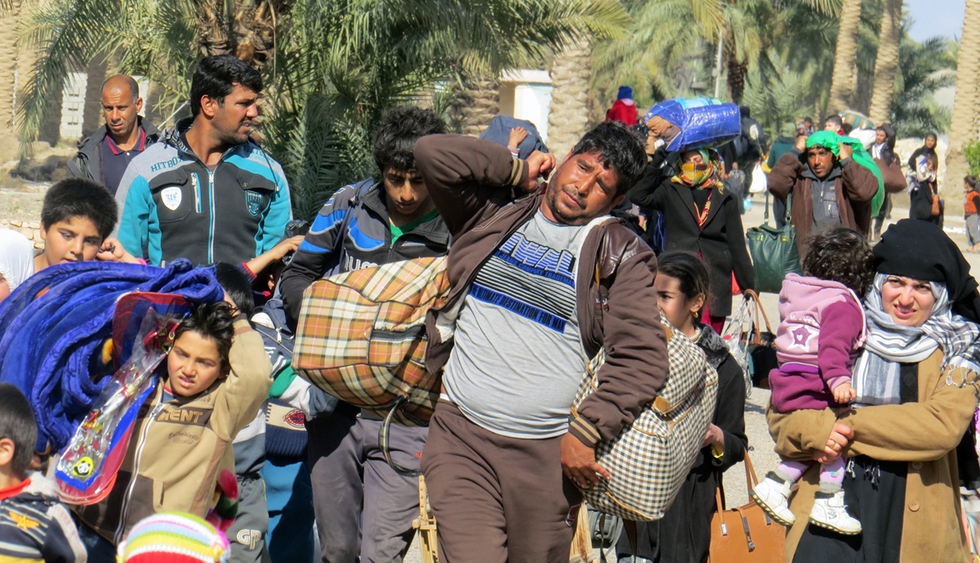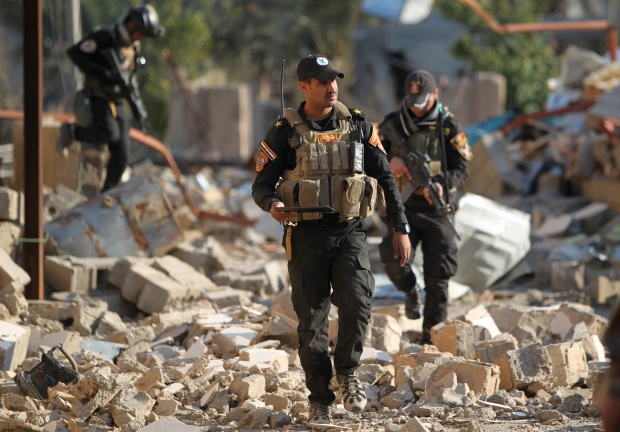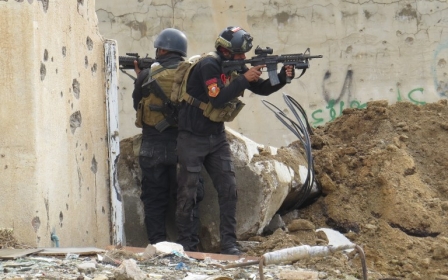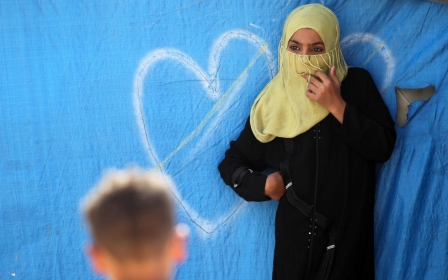Iraqis run gauntlet of Anbar's hidden terrors to flee IS

BAGHDAD - It was New Year's Day when Faris Yahiea decided he, his wife Ghufran, his son and his parents would flee their home in central Ramadi as Iraqi forces advanced to take the city. The 26-year-old and his family were among 31 who set out from the Taamiem area, afraid of the violence that was closing in.
Faris feared what the Shia-dominated security forces would do to the families of Sunni men like him, who had lived under Islamic State (IS) control for almost two years. But it was not the Shia who destroyed his world.
The group had decided to send women and children ahead with white flags, as advised by a friend of Faris who had also fled. But a hidden bomb, planted by IS fighters, exploded among the main party and Faris's wife, son and a cousin were all killed.
"Ghufran was afraid and insisted to remain behind," Faris told Middle East Eye with a trembling voice. "[The blast] was eight metres away from me, no more. I survived, but they died.
"I do not know if she walked on the IED or Daesh (IS) remotely exploded it. All I know is that I lost her and my son."
IS has used "improvised explosive devices" to booby trap roads, buildings, pylons, bridges and river banks, and placed snipers in high positions as it seeks to hamper the progress of its enemies in Ramadi, where fighting still rages.
Iraqi troops have adopted new tactics to avoid them, but civilians like Ghufran and her son often fall prey.
Speaking from a refugee camp at what was once a holiday destination in Habaniya, 25km east of Ramadi, Faris said of his wife: "I had a strong feeling that I would lose her. I hugged and kissed her dozens of times. She felt strange and I told her I did not know why I had a feeling that we would be separated for a long time.
"It was 1 January. People are usually celebrating a new start. I used to, but not anymore."
Faris's group was one of thousands to heed the call of the Iraqi army in Anbar, which dropped leaflets telling them to leave to "avoid the harm of air strikes". As long as they were unarmed, moved in groups and raised a white flag they would be safe, the leaflets said.
But since December, about 20 civilians have died and scores been injured by IEDs while trying to flee. Iraqi military officers said they had "missed the determined safe corridors".
"They (IS) have been snaring everything. Bobby traps are everywhere and most of our causalities, recently, were because of the IEDs," Colonel Mohammed al-Baidhani, a spokesman for Iraqi security forces, told MEE.
"We have intelligence sources inside these (IS-held) towns. They lead people out through the safe corridors which we determined, but some of them were randomly moving," Baidhani said.
"We had to change our tactics and move around these IEDs but still, our big problem is the booby traps which could be [wired to] a door handle, a power point, a flag, a stone, an animal corpse - anything."
For civilians, getting out safely is just the first step.
Women and children are separated from their husbands and male relatives and sent to "displacement camps," while many men and young males are held in custody to "collect information" and root out IS collaborators.
On 10 March, Iraqi security forces claimed to have found 56 "terrorists hiding among families" who had left al-Zanghorah village, western Ramadi, in an attempt to find safety.
"Those people are valuable sources for us," a senior Iraqi official told MEE. "They have been providing information about the structure of [IS], their tactics, names of local leaders, perpetrators, supporters and many other things.
"All men and young males are subject to interrogation and their [criminal] records have to be checked," the officer said.
Local Anbar officials told MEE that the number of those fleeing IS-held towns such as Hit, Kabisa and Haditha has soared in the last two weeks as the Iraqi forces advanced.
As a result, the military has been forced to set up temporary camps nearby to deal with the influx of internally displaced people (IDPs).
"We had many preparations [to receive the IDPs] but the unexpected numbers have made the situation much more difficult during the last few days," said Mustafa al-Urssan, Anbar's deputy governor.
Urssan and many military sources told MEE that tens of thousands of people were expected to flee the towns along the Euphrates river in western Anbar as Iraqi security forces advance.
There are already 3.3 million IDPs in 3,500 sites across the country, according to statistics issued by the UN mission in Iraq this month.
And that may not happen for some time. Security officials and local politicians confirmed that those fleeing could be interrogated for days or even weeks, depending on evidence presented against them.
Faris, his father and his two brothers, were among those who spent weeks in custody.
Still mourning the loss of his family, Faris was held for six weeks, and his relatives for four.
"My father-in-law provided information suggesting that me, my father and my two brothers are involved with Daesh," Faris said.
"He blames us for the death of his daughter, so this was his way to get revenge.
"I have nothing to do to compensate him. I called him after I was released and told him that my loss was as big as his, and I wish I was the one who was dead instead of Ghufran."
New MEE newsletter: Jerusalem Dispatch
Sign up to get the latest insights and analysis on Israel-Palestine, alongside Turkey Unpacked and other MEE newsletters
Middle East Eye delivers independent and unrivalled coverage and analysis of the Middle East, North Africa and beyond. To learn more about republishing this content and the associated fees, please fill out this form. More about MEE can be found here.





